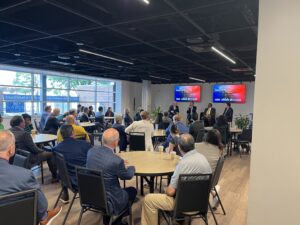Public Policy, Chattanooga Chamber
2019 has been a year of firsts: new governor, new senate majority leader, new house leadership, to name a few. This was also a year of firsts for the Chattanooga area Chamber of Commerce.
To ensure our efforts accurately reflect the priorities of our members, we polled them on their Public Policy interests. Based on results, we developed the 2019 Public Policy Agenda that served as our playbook this session. We intentionally brought in elected officials from across the state to give our members the opportunity to hear directly from decision makers about the topics at hand. And we grew our advocacy network through legislative updates, social media and many face-to-face meetings.
In fact, all the changes occurring at the state level made it a perfect time for the Chattanooga Chamber to sharpen our public policy focus.
Were we impactful? Let’s take a look.
Based on our member survey, our top five legislative priorities were: economic development, talent development, transportation and infrastructure, public safety and health care.
We followed 431 pieces of legislation that impacted these five priority areas this session, tracking down amendments, lending our support or speaking with members about their concerns. We won’t bore you by highlighting all 431 bills (trust us, you don’t want that) but we will hit the highlights.
Economic Development
Growing our region’s economy and supporting sustainable community development are at the core of our mission. To ensure our region continues to thrive, we support projects and concepts that enhance quality of place, making Chattanooga an even more attractive place to live, work and grow a business.
SB165/HB665 Public Chapter 429 – UAPA – Continuation of Permanent Rules
This bill is passed each year and is sponsored by the chairs of both House and Senate Government Operations. Though short (three paragraphs), it enacts or continues all the rules that have been heard in Government Operations. The biggest implication for the business community this year is that the bill included language to clarify that the Department of Revenue is no longer prohibited from collecting internet sales tax in Tennessee. The rule states that out-of-state dealers who make sales exceeding $500,000 to consumers in Tennessee during the last year are now subject to the appropriate tax. We supported the collection of online sales tax as it creates a more even playing field between out of state online retailers and smaller brick and mortar stores in your neighborhood.
SB355/HB327 Public Chapter 257 – Brownfield Redevelopment Projects
Sen. Gardenhire and Rep. Howell passed this bill that extends the urban brownfield redevelopment statute to include a qualified opportunity zone certified under the federal Tax Cuts and Jobs Act of 2017. In Chattanooga, only a small portion of land could take advantage of the tax incentive program under current law. Now, the sales and property tax incentives are available if the economic development efforts are within an opportunity zone anywhere in the state. Certain conditions apply.
SB513/HB1265 Public Chapter 451 – Fair Accountability and Clarity in Tax Subsidies Act
This bill, as originally filed, removed a lot of the Commissioner of Economic and Community Development’s discretion on how he/she could use economic incentives to recruit businesses to Tennessee. One concern here for companies who accept these incentives is that their trade secrets, supply chain data and other proprietary information could be subject to open records. The Chattanooga Chamber, State Chamber, the governor’s office and the state Economic and Community Development Department (ECD) worked with sponsors to reach a compromise that we feel does not hurt the state’s economic development efforts. The bill, as passed, only deletes state incentives that have never been used, restores the commissioner’s discretion in most circumstances and authorizes ECD to execute any claw back provisions to recover capital grant funds if the beneficiary fails to fulfill the commitments related to the grant.
SB1100/HB247 Public Chapter 416 – Orders Daylight Savings Time as the Standard Time of Tennessee
This bill as originally filed would have made daylight savings time (summertime hours) the standard time of the state throughout the year. This means that East Tennessee, which is now on Eastern Time, would not “fall back” one hour each November, thus putting Chattanooga, and the rest of East Tennessee, on Atlantic Time. The rest of the country would have continued to “fall back” one hour each fall. This would have created a logistics problem for business in East Tennessee and especially Chattanooga where Tennessee, Alabama and Georgia would be in three different time zones. The Chattanooga Chamber worked with the sponsors, as well as Rep. Hazlewood in House Finance, to add an amendment to the bill that stops automatic enactment if Congress authorizes states to set their own time zone. The bill that passed requires the General Assembly, by joint resolution, to confirm the congressional action and authorize the time change. At this time, a thorough debate can occur before sending Chattanooga into the Atlantic Time Zone to hang out with Puerto Rico and parts of Greenland.
Talent Development
One of the most effective ways to support our region’s workforce is through responsible education and workforce policy. From early childhood education to tailored talent development initiatives, the Chattanooga Chamber supports legislation that keeps our robust education system flexible to meet our shifting workforce needs.
SB63/HB866 Public Chapter 366 – Expands Career and Technical Education Programs to Middle School Students
This bill encourages the Department of Education to prepare students in middle school for a career in technical education by introducing them to career exploration opportunities in high-skill, high-wage or in-demand career fields. As Chattanooga feels the talent crunch like most of the country, it is important for the future lifeblood of our workforce to be exposed to a variety of employment opportunity.
SB625/HB681 Public Chapter 379 – Volunteer Public Education Trust Fund Act
Sen. Watson and Rep. Helton passed a law this year that revises provisions of the Volunteer Public Education Trust Fund. This bill allows the state treasurer to accept funds from a private or public entity that may be earmarked for a specific purpose and for a specific local education agency. As our county grows, it’s importantthat we have multiple revenue sources to ensure Hamilton County students have the tools to learn and graduate ready for the 21st century workplace.
SB1151/HB1339 Public Chapter 454 – Offering Computer Science Courses at High Schools
This bill requires the Department of Education to develop a state plan for computer science in grades K-12 including, but not limited to: ensuring high school students have access to at least one computer science course, integrating computer science into elementary education and allowing computer science to count as a core admission requirement at higher education institutions. Chattanooga is known for its fast internet. This bill has the ability to create a pipeline of tech talent by increasing interest in the field and therefore increasing economic development opportunities in the tech scene.
Transportation and Infrastructure
It’s no secret that Chattanooga’s geographic location makes it a gateway to the rest of the U.S. It is critical that Tennessee,and Chattanooga specifically, invest in infrastructure that encourages businesses and our economy to flourish. We fully support projects, like the swift completion of the InterstateI-75/Interstate I-24 split, that will create and retain jobs and opportunities for the people and organizations of Chattanooga and Hamilton County.
SB178/HB164 Public Chapter 116 – Persons Unable to Connect to the Public Sewer System due to Moratorium
This bill, sponsored by Sen. Gardenhire and Rep. Hazlewood, allows the Tennessee Department of Environment and Conservation to issue septic tank permits while the federal moratorium is in place. Previously state law would not allow this. Without this law, all development would have stopped in east Hamilton County until the federal wastewater moratorium was lifted or a new sewer treatment facility was built. This new law allows progress to continue while ensuring the environment is protected.
SB663/HB756 Public Chapter 98 – Motor Carrier Safety Improvement
Sen. Watson sponsored this bill which provides clarity and increased safety measures for the logistics industry in Chattanooga and Hamilton County. Currently, if a company hires a contract truck driver, and wishes to install a device that monitors the driving habits of the contractor, labor law could be interpreted to mean that the installation of that device constitutes an employer/employee relationship. This bill allows the company to require such a device be installed while maintaining the contractor status of the driver. This bill will go a long way in making sure our highways are safe and may even cut down on the amount of time you sit in traffic.
SB1364/HB531 Public Chapter 129 – State-Aid Highway Fund Match
This bill makes permanent the 2% match that counties have to provide for state-aid highway funds. In 2015 a bill created the County Road Relief Act which lowered from 25% to 2% the match that the county shall provide of approved project costs. This bill had a two-year sunset provision which renewed in 2017. This bill removes the sunset provision entirely. Having a lower threshold by which to access state dollars to improve the infrastructure in our community is vital to businesses and economic development.
Public Safety
Public safety is critical to the quality of life we enjoy in Chattanooga and Hamilton County. We support legislation and policies that enhance public safety and foster an environment where business and our local economy thrive.
SB173/HB164 Public Chapter 412 – Hands Free Device while Using a Cell Phone and Driving
Heads up. Phone down. A new law passed this year that creates a Class C misdemeanor punishable by a $50 fine for using a cell phone with your hands while your vehicle is in motion. We all know how dangerous distracted driving can be and have all likely experienced that moron swerving in traffic while trying to get that important tweet out to the world. This bill gives law enforcement additional language in the code by which to cite these drivers. If you’re driving and wish to talk on the phone, put it on speaker or invest in a Bluetooth device.
Sb1039/HB909 Public Chapter 474 – Elderly Abuse and Vulnerable Adult Protection Act of 2019
This bill was sponsored by Sen. Gardenhire and co-sponsored by every member of the Hamilton County delegation in the House. This bill creates a class C felony when a person commits aggravated abuse of an elderly or vulnerable adult. This is an important bill spearheaded by the Chattanooga delegation and will go a long way toward protecting individuals who are unable to protect themselves.
SB1402/HB754 Public Chapter 732 – Firearm Prohibitions for Persons Suffering from Mental Illness
Rep. Smith passed this bill which creates a Class A misdemeanor offense for the transfer of a firearm to a person who has been judicially committed to a mental institution or is currently receiving inpatient mental health and substance abuse treatment. At a time where gun violence seems to be pervasive in our society, this bill is a common-sense gun regulation.
Health Care
We support legislative and policy changes that reduce the cost of health care and provide additional access to affordable quality health care.
SB312/HB389 Public Chapter 373 – Employer Drug Testing
This bill, sponsored by Sen. Watson and Rep. Helton, sets a six-month limitation to take into account valid prescriptions after a positive confirmed drug test. Under previous law, a medical review officer had the discretion to void a positive drug screen if an individual had been legally prescribed a medication sometime in the past. Under this bill, the medical review officer can only void a positive drug test if the individual received a valid prescription for the same substance within the past six months. This applies to individuals who are subject to drug tests pursuant to the drug-free workplace provisions of state law.
SB474/HB771 Public Chapter 434 – Annual Coverage Assessment Act of 2019
This bill, sponsored by Rep. Hazlewood, established an annual coverage assessment on hospitals of 4.87% which generates state matching dollars to fund key services and benefits for TennCare recipients. The estimated fiscal impact of the bill shows a $2.1 billion increase in revenue to businesses in the state. This bill prevented the loss of TennCare services such as physical, occupational and speech therapy, a reduction in reimbursement for non-emergency services for children aged 12 to 24 months, prevents limits being put on patient lab and X-ray procedures and ensures funding will continue for graduate medical education. Furthermore, this legislation prohibits hospitals from increasing charges or adding a surcharge to patients as a result of the assessment. Ensuring that coverage is available to Tennesseans and that hospitals will continue to be reimbursed for the care they provide is paramount to the heath of Tennesseans and will work to keep health care costs from rising.
SB510/HB419 Public Chapter 407 – Right to Shop
This bill, sponsored by Rep. Smith, established the Tennessee Right to Shop Act. It requires health insurance carriers to implement a shopping and decision support program that provides options and decision support services for enrollees in a health plan. One of the Chattanooga Chamber’s 2019 Policy Agenda items is to support legislative and policy changes that reduce the cost of health care and provide additional access to affordable quality health care. The intent of this bill falls in line with this goal as consumers will now have more control over health care choices.
SB960/HB1138 Public Chapter 159 – Repeal the Physical Fitness Facility Amusement Tax
The Chattanooga Chamber actively supported this bill which repealed the amusement tax on small fitness centers. The Chamber’s 2019 Policy Agenda included addressing this and we appreciate the Hamilton County delegation and Lee administration for working with us toward a healthier Tennessee. We also thank our friends at the National Federation of Independent Businesses for spearheading advocacy efforts in Nashville.
All of these ideas don’t simply become law overnight. We want to take this opportunity to thank the Hamilton County delegation for their hard work this session and for being true servant leaders. All members of our delegation, on both sides of the aisle, have an open door and are happy to discuss issues that are important to our Chattanooga Chamber members.
Do we always agree? Of course not. We shouldn’t; that’s healthy. Differing opinions and varying philosophical beliefs ultimately make good law that stands the test of time. Legal, fiscal review and support staff also deserve immense credit for keeping up with what is always a hectic time of year. They are sometimes on the receiving end of complaint phone calls but rarely receive calls thanking them. So a big thank you to the legislative staff who make all this possible.
And finally, we want to thank our Chattanooga Chamber members. You are the catalyst that enables this work. We trust you find value in our policy work and we want you to know that we have an open door policy. Ultimately, this work is only meaningful when it helps real people, with real businesses, who have real issues that impact their ability to be successful. We are honored to be your voice on Chattanooga and Hamilton County business issues.








